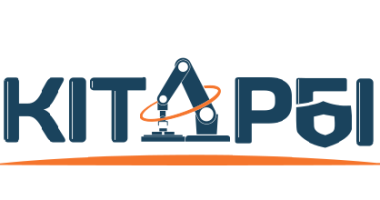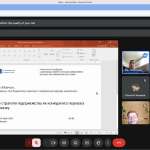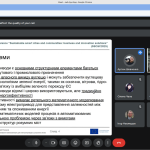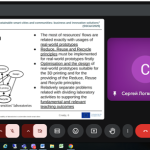The international conference “Sustainable Smart Cities and Communities: Business and Innovative Solutions” was held (SDG 4, SDG 11, SDG 12, SDG 17)
The international conference “Sustainable Smart Cities and Communities: Business and Innovative Solutions” was held, which was organized by the Department of Computer-Integrated Technologies, Automation and Robotics of the Kharkiv National University of Radio Electronics together with the Kharkiv National University of Urban Economy named after O.M. Beketov, Bratislava University of Economics and Management (Slovakia), Public Organization “Perspektyva” (Poland), Hungarian University of Agriculture and Natural Sciences.
The conference was organized within the framework of the implementation of the international project Erasmus+ Jean Monnet Module “Ukraine-EU: Circular Economy Solutions for Smart and Sustainable Cities” («Ukraine-EU: Circular Economy Solutions 4 Smart and Sustainable Cities (Eco4Smart)») – # 101127659) in the context of sustainable development goals:
- SDG4. Quality education
- SDG11 Sustainable development of cities and communities
- SDG12 Responsible consumption and production
- SDG17 Partnership for Sustainable Development
At the plenary session
Ivan Movchan, founder and director of the Ukrainian Weighing Company, shared his own experience in implementing the company’s ESG strategy in the context of ensuring the company’s competitiveness and expanding cooperation markets.
Yuriy Romashov, professor of the Department of Computer Integrated Technologies, Automation and Robotics of the NURE, presented laboratory research as a direction for implementing the principles of the circular economy for sustainable development.
Artem Shevchenko, a student of the NURE, presented a model of electricity consumption by electric drives in the context of the development of smart cities.
Key insights of the meeting:
- European experience in implementing the circular economy confirms its relevance in the context of the competitiveness of business and the state as a whole;
- Laboratory research should be systemic and become the mainstay in the development of innovations in the context of resource efficiency;
- It is important to integrate the circular approach in all areas of the economy and attract more businesses to circular models;
- Strengthening cooperation between business and researchers should occur through dialogue and the development of transparent algorithms, methods, and tools for the transition of business to circular models and strategies;
- Ensuring sustainable development is possible through social responsibility and cooperation between business, educational institutions, public organizations, and government bodies;
- Dual education is a promising direction for integrating education, the labor market, and business, which allows for the preparation of competitive specialists who meet the labor market; for business, this approach provides companies with high-quality human resources.
Link to the project website of NURE
Link to the project on Facebook






